Whilst “the next young generation of British jazz” has been applied many times to London’s current jazz scene, this headline from Melody Maker was in fact used to describe Alan Wakeman and his band back in 1970. The young alto saxophonist, influenced by Charles Mingus and mentored by Mike Westbrook, was composing singular, large ensemble pieces at a time when jazz had long left the limelight and rock was in the foreground.
Now, two separate Wakeman Octet ensemble recordings, made in ‘69 and ‘79 for BBC radio broadcast, are being released as a double LP via Gearbox Records.
These recordings – which are being released commercially for the first time ever – are representative of a magical period in British jazz which deserves to be unearthed and heard again. If a prototype for Binker and Moses’ viscerally energetic semi-free sound is sought, you would be hard pressed to find a closer relative than Wakeman on these particular sessions. Nodding to traditional chorales, his dexterously varied compositions ooze curiously English-sounding brass band pastoral warmth, whilst also leaning towards atonal conceptual forms and modern experimental compositional techniques.
Speaking about Wakeman’s playing, Mike Westbrook says:
Seemingly free of stylistic limitations, Alan has a open-minded approach to music that enables him to be creative in any context. He approaches a solo apparently without preconceptions, and his total commitment is there in every note, heart and soul. There is no-one who can touch us quite so deeply on a ballad, or raise the temperature on stage with such reckless abandon when the mood takes him.
Taken from the original tapes, all of the tracks featuring on the ’69 recordings were written specifically for these broadcasts – the compositions have never been released elsewhere. Similarly, both octets that featured on their respective recordings were a onetime formation and never went onto record or tour together. The result is a one-of-a-kind snapshot into a time when British jazz was at another high, featuring such names as John Taylor, Alan Skidmore, Paul Lytton, and Art Themen, who themselves were contemporaries of and collaborated with the likes of Evan Parker, Michael Garrick, Ian Carr and Roscoe Mitchell.
Speaking about the recordings in the liner notes for the release, Wakeman, says:
Broadly speaking, it was an exciting time for the performing arts in the late 60s and 70s, when many different disciplines and styles intermingled happily in theatre, rock, classical music, film and jazz. Concerts would become events, with visual projections, costumes and more interactive elements for audiences to appreciate. A distinctive, freer style of jazz was emerging in Europe and I became hugely influenced during my sixth form years by being exposed to the thoughts and music and musicians associated with Mike Westbrook when he came to teach art at my school (an experience that must have put him off teaching for life)… I should add that I wrote all the music for both dates with the particular musicians who took part in mind: the Ellington concept of the musicians making the music.
Alongside the announcement of the new double LP, Wakeman has also shared a trailer for the album, as well as the first track to be taken from the LP











